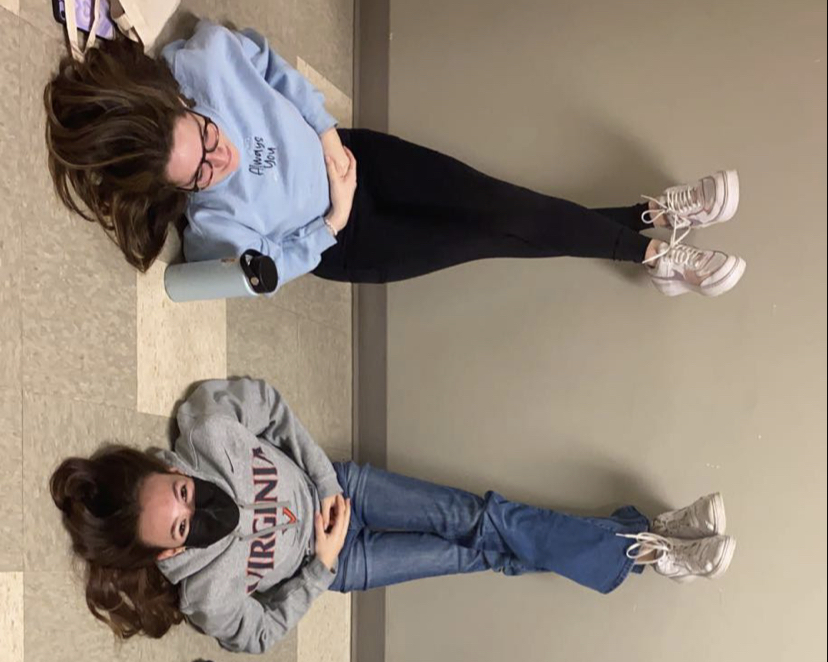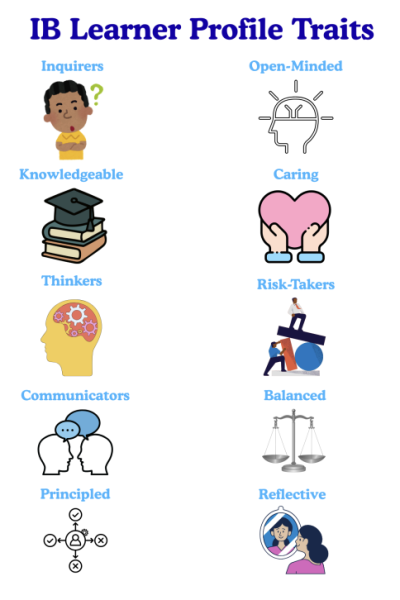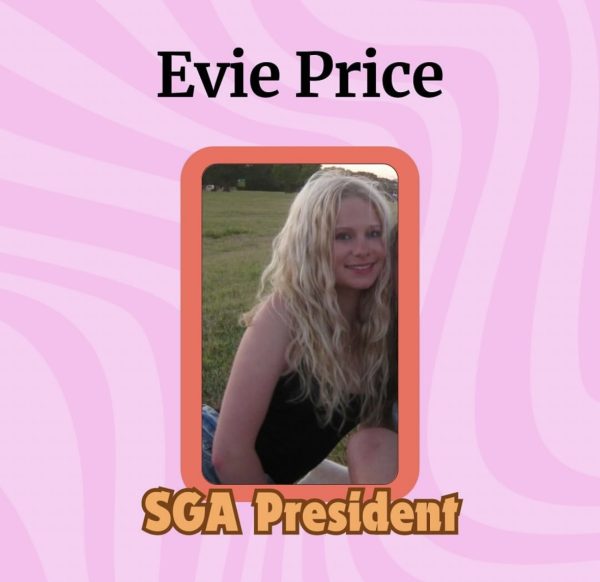Making the impossible POTS-sible
Club started for POTS awareness
Juniors Yarden Footlik and Ilana Newton sit with their legs against the wall to reallocate blood. Footlik’s POTS caused her to lose blood flow to her brain, Newton, a friend, sits with her in the hallway while she works on her circulation.
A new club to fundraise and raise awareness of postural orthostatic tachycardia syndrome (POTS) was started by three students here at the school
When you get a cold, most of the time you pop a few ibuprofen, awkwardly blow your nose during class, and fight off lethargic tendencies until 3 p.m. Rarely would you be pulled from school or worry about if you were physically capable of walking down the hallway unattended. That, however, is the norm for at least three students here at the school affected by postural orthostatic tachycardia syndrome (POTS).
The symptoms of POTS range from mild brain fog and hyperhidrosis (excessive sweating) to severe heart palpitations and fainting. The syndrome itself is a form of dysautonomia, meaning the nervous system which controls basic functions of the body is impaired, causing many issues with digestion, breathing, and heartbeat.
“POTS affects everything in your body. It’s your whole nervous system. So when I had something as little as a cold, it wasn’t COVID, just a common cold, it completely drained me. I could not get out of bed. I could barely lift my head. I couldn’t even walk to the bathroom without passing out,” junior Yarden Footlik said. “So obviously that affected school because I couldn’t go and I was pretty much in bed for a week just because of a cold. It’s very stressful because once you’re better, you have to get back to what you missed, but you had like a week off when there wasn’t supposed to be. That’s not what a lot of people have to deal with, so it’s hard to explain ‘oh, I had a cold so I stayed home for a week’. Like, it sounds ridiculous.”
Some people are predisposed to POTS by being born with Hypermobile Ehlers-Danlos syndrome (HEDS) which allows for a host of side effects like elastic skin, joints, and blood vessels. The extra space between ligaments and the ability of the body to stretch to accommodate blood pooling in the extremities deprives the brain of oxygen. The body’s response to the deficit is lightheadedness or syncope, passing out due to hypotension, as the veins do not constrict enough for proper circulation.
“Obviously, something was wrong, but most doctors just saw that as anxiety and stress from school. But when it continued into the summer… it wasn’t. So everybody was kind of scratching their heads,” junior Harper Woolcock said. “But it was also like ‘it’s kind of in your head because you’re a teenager. You’re not really supposed to be sick like that.’”
There are also mental health impacts of POTS as it affects hormone regulation and prevents the mobility of patients, therefore limiting interpersonal relationships. Anxiety, dissociation, and depression are common amongst “POTheads.” These symptoms are often remedied with medications alongside therapies, but balancing both the physical and mental aspects of POTS can be taxing.
“I mean, everyone struggles with stuff. But I think the hard part about having health issues is you can’t compartmentalize it, it’s a constant presence. It’s not something you can just ignore or hope will go away because you have to really dedicate yourself to treating it,” junior Katherine Hamilton said. “You can’t run away from having POTS, it’s just there.”
Because of the tachycardia (rapid heartbeat), fatigue, and chemical imbalances caused by POTS, it is often misdiagnosed as anxiety. Seemingly mimicking panic disorders, the syndrome can go untreated to the point where patients’ lives become endangered. Losing consciousness when moving from a laying down or sitting position to standing up can pose major health risks without a caretaker present to prevent harsh falls, even when leaving the class or stepping out of a car.
“My mental health has definitely suffered because of POTS. Now, I’ve had mental health issues for longer than that, but they definitely got way, way worse with being undiagnosed [and] poorly treated,” Hamilton said. “My medical team did the best they could, but when you’re incorrectly diagnosed, obviously you’re not doing a very good job at it.”
POTS can last a lifetime for some, and only through puberty for others, it is actually fairly common, and those who have it can be prescribed blood pressure medications and salt tablets. This helps regulate and constrict vessels to improve circulation, retain water in the kidneys, and aid in limiting other adverse side effects which take time and patience to treat.
“This changed my life in very negative ways. I don’t think that there’s a silver lining… maybe that I’m a more resilient, compassionate person,” Hamilton said. “But other than that, I think it’s made my mental health worse. Obviously, my physical health is in jeopardy. My relationship with friends has been difficult because of POTS because sometimes I’m not able to socialize because I’m too tired.”
The three founders of the Dysautonomia Awareness Club are Footlik, Hamilton, and Woolcock, who wanted to inform others about and contribute to causes that support research for these types of dysfunctions. Although it can be difficult to manage symptoms as they interfere with schoolwork, relationships, and mental wellbeing, it was with the help of the school that they were able to attain medical aid on the premises. These shadows are able to assist them physically, while counselors and teachers help to adjust schedules to accommodate their hectic lifestyles.
“My teachers are really supportive,” Hamilton said. “The vice principals and everyone are really supportive. They’re all really nice to me. My counselors [are] great. Yeah, this is a really good community here and I’ve had nothing but good experiences.”
What did you think about this story? Do you have any suggestions for improvements or other articles that you would like to see? Please use the contact form to communicate with us! (Keep all information school-appropriate)
https://docs.google.com/forms/d/e/1FAIpQLSeRYRWwLLzvs2rqwHSGdr-DQRvxhUSx9UcaXypXxnvVuCqwyA/viewform










